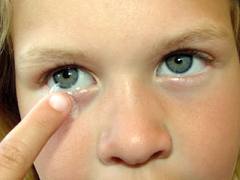In a series of rigorous clinical trials over several years, investigators have been researching the feasibility, risks and benefits of contact lens wear in children.
The most recent data is from the Adolescent and Child Health Initiative to Encourage Vision Empowerment (ACHIEVE). The ACHIEVE study looked at whether contact lenses affect how children feel about themselves. The children (between 8 and 11 years old) in the contact lens group felt significantly better about themselves compared to the eyeglass wearers in three specific areas: athletic competence, social acceptance and physical appearance.
 This doesn’t mean that children actually performed better after they began wearing contact lenses; rather, it means they felt more competent and confident about their performance in those areas. But perception can become reality. According to Mitchell Prinstein, professor and director of clinical psychology at the University of North Carolina, “Children’s sense of self-concept can alter their whole course of development,” he says. “Kids who feel more confident about sports or social activities are more likely to engage in those experiences, which further builds their skills and makes them more open to similar experiences in the future.”
This doesn’t mean that children actually performed better after they began wearing contact lenses; rather, it means they felt more competent and confident about their performance in those areas. But perception can become reality. According to Mitchell Prinstein, professor and director of clinical psychology at the University of North Carolina, “Children’s sense of self-concept can alter their whole course of development,” he says. “Kids who feel more confident about sports or social activities are more likely to engage in those experiences, which further builds their skills and makes them more open to similar experiences in the future.”
Not all children are ready for the responsibility of contact lens wear at 8 years old, but we at Westside Optometry have seen children that young succeed with the handling, and care of contact lenses. To see a comparison of contacts and glasses, click here.